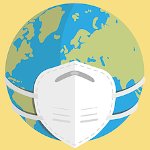International Day of Epidemic Preparedness Date in the current year: December 27, 2026
 The International Day of Epidemic Preparedness is observed annually on December 27. It was included in the United Nations international days calendar after the COVID-19 pandemic had demonstrated the devastating effect of pandemics and epidemics on the global economy and health care.
The International Day of Epidemic Preparedness is observed annually on December 27. It was included in the United Nations international days calendar after the COVID-19 pandemic had demonstrated the devastating effect of pandemics and epidemics on the global economy and health care.An epidemic is the rapid spread of a disease, typically an infectious one, to a large number of people in a given population within a short period of time. If an epidemic of an infectious disease has spread across multiple continents or even worldwide, it is referred to as a pandemic (with an exception of widespread endemic diseases with a stable number of infected individuals such as seasonal flu).
Infectious diseases that have been the source of devastating epidemics and pandemics include plague, cholera, dengue fever, influenza, smallpox, tuberculosis, measles, leprosy, malaria, and yellow fever. One might think that humanity, having gone through so many of them, would be prepared for new ones, but the COVID-19 pandemic has proven that this is far from the case.
The first outbreak of COVID-19, a contagious disease caused by SARS CoV-2 (severe acute respiratory coronavirus), occurred in Wuhan, China in December 2019. Over the following months, it spread across the globe, leading to the World Health Organization declaring a pandemic in March 2020. Soon after, most countries introduced measures to prevent the spread of the novel virus, ranging from PSAs to strict lockdowns.
As of December 2021, the pandemic had caused 5.35 million deaths around the globe and triggered severe social and economic disruption on a worldwide scale. The global economic recession caused by the pandemic was the largest one since the Great Depression. According to the United Nations, the pandemic was a health, economic, security, humanitarian, and human rights crisis all wrapped in one.
The devastating impact of the COVID-19 pandemic has demonstrated the importance of epidemic preparedness at all levels: from international (the willingness of governments and organizations to cooperate in the development of vaccines and the introduction of uniform and simultaneous anti-epidemic measures) to national (introducing nationwide preventive measures, increasing healthcare capacity, organizing and promoting vaccination) to individual (personal responsibility in preventing the spread of infection, i. e. wearing a mask, getting vaccinated, etc.).
That is why the United Nations General Assembly proclaimed December 27 as the International Day of Epidemic Preparedness. Its main objective is to demonstrate the importance of international cooperation in tackling global health challenges in order to mitigate the impact of epidemics and pandemics and to ensure that disproportionate devastation similar to that caused by the COVID-19 pandemic never happens again.
If we do nothing, future epidemics could surpass the previous ones in terms of their devastating impact. But if we cooperate and raise international awareness, we will be able to respond to any epidemic that may arise as quickly and adequately as possible.
- Category
- UN Observances
- Tags
- International Day of Epidemic Preparedness, UN observances, UN international days, international observances, epidemics and pandemics